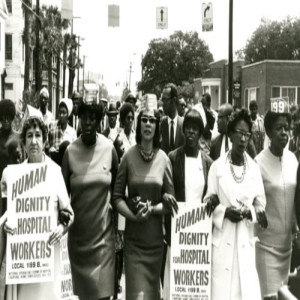
On this day in labor history, the year was 1969.
That was the day hospital workers in Charleston, South Carolina won union recognition.
The 113-day strike reflected all the broader social issues of the day.
Led primarily by black women, the strike at the Medical College, Charleston County and several other hospitals intersected civil rights and racial and gender discrimination on the job.
Jewel Charmaine Debnam notes that women like Local 1199B president Mary Moultrie, Naomi White and others were “essential to the strike not only as daily participants on the picket line but also as leaders of the local movement establishment.”
For months, strikers marched, walked picket lines, clashed with police and held vigils demanding their right to organize.
They defied injunctions and endured hundreds of arrests, nightly curfews and confrontation with the State National Guard.
Governor McNair and the hospital boards had initially refused to concede to the workers’ demands for union recognition.
They claimed workers paid with public funds could not engage in collective bargaining. But the women were steadfast.
They pointed to the wage disparities between black and white workers and between male and female workers.
They also protested the blatant disrespect and discrimination meted out daily by management.
Local longshoremen solidarized with the strikers and threatened a walkout in support if their demands were not met.
Coretta Scott King and many other Civil Rights leaders also played a supportive role.
Finally, the new union won reinstatement of fired workers, which had touched off the strike, a solid grievance procedure, a minimum wage raise and access to the credit union.
Victory would be short lived however when the State almost immediately refused to hold up its end of the agreement.
More Episodes
 2023-04-11
2023-04-11
 2023-04-10
2023-04-10
 2023-04-08
2023-04-08
 2023-04-07
2023-04-07
 2023-04-06
2023-04-06
 2023-04-05
2023-04-05
 2023-04-04
2023-04-04
 2023-04-03
2023-04-03
 2023-04-02
2023-04-02
 2023-04-01
2023-04-01
 2023-03-31
2023-03-31
 2023-03-30
2023-03-30
 2023-03-29
2023-03-29
 2023-03-28
2023-03-28
 2023-03-27
2023-03-27
 2023-03-24
2023-03-24
 2023-03-23
2023-03-23
Create your
podcast in
minutes
- Full-featured podcast site
- Unlimited storage and bandwidth
- Comprehensive podcast stats
- Distribute to Apple Podcasts, Spotify, and more
- Make money with your podcast
It is Free
- Privacy Policy
- Cookie Policy
- Terms of Use
- Consent Preferences
- Copyright © 2015-2024 Podbean.com




